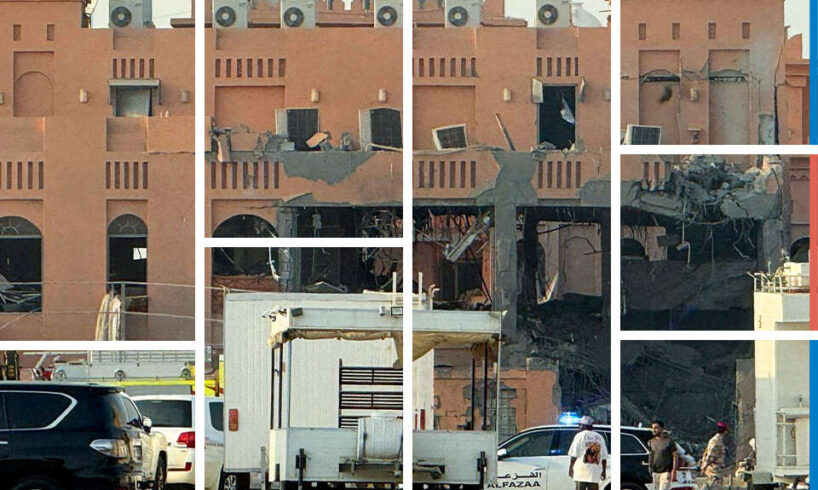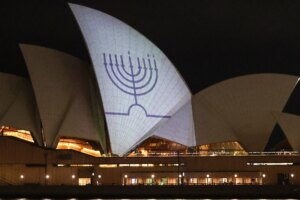
Who was in the red house
The Arab diplomat walked through the corridors of Washington’s MEAD conference just as the news came in about the assassination attempt in Qatar. What’s your reaction, he was asked. “This is very serious,” he replied. But a wide grin spread across his face. “Very serious,” he repeated, still smiling.
This very week last year, the same forum convened in Washington, and the difference between the two is instructive. Last year, it was a week since the murder of the six hostages in Gaza, and a week before Israel’s pager operation against Hezbollah.
At the time, Israel looked like a battered truck that had entered a one-way street against the traffic, with no way out. On the conference stage, the Biden administration justified the partial arms embargo, while then-envoy Amos Hochstein explained that Israel had nothing to gain — and only what to lose — from war with Hezbollah. Iran, meanwhile, was racing toward nuclear capabilities.
A year later, senior Trump officials explained on stage why they would back Israel — almost at any cost. The new president’s envoy, Tom Barrack, predicted imminent Israeli-Lebanese normalization, and spoke of the dismantling of Hezbollah in a matter of months.
Last year, Israel was the punching bag of the Middle East. Now the perception is that it is the neighborhood bully that needs restraint. The Jewish state’s neighbors, meanwhile, did not exactly mourn the slap Qatar received, but they fear nevertheless that Israel is overstepping its bounds.In April, Strategic Affairs Minister Ron Dermer said that within a year the war would already be over, and normalization agreements would be signed with various states in the region. That forecast has not changed — in fact, it has apparently become more optimistic. Dermer now believes the war can be over with by the end of 2025.
Indeed, the assassination attempt in Doha was meant to achieve just that. The hope was that the killing there would do to Hamas what Hassan Nasrallah’s assassination did to Hezbollah — removing from the picture those opposing a ceasefire. The very fact that Donald Trump’s Gaza proposal is being seriously discussed within the terror organization’s leadership shows their deep concern.
A senior source once suggested to me that hostages for Hamas are like nuclear weapons for a threatened state — their number can be reduced, but there will always be at least one for survival. Perhaps the analogy was not entirely accurate. If Hamas is convinced that Israel will enter Gaza City, and that entry into the city means Hamas’ defeat, it may release the living hostages to prevent its total destruction. The people who opposed that vocally were supposed to be in the Red House in Qatar.
Stretch marks
So how bad is Israel’s situation in America? Bad, thanks for asking.
The question is, how stable. An expert on US-Israel relations offered a broader perspective this week: since the Iraq war, the American public has viewed wars negatively. Armed conflict means negative coverage, especially a two-year conflict, and all the more so one in which almost all the suffering is inflicted on the other side.
The main problem is in the Democratic Party, of which more than half the representatives in Congress signed a letter proposing an arms embargo on Israel. What’s interesting, however, is who did not sign it. There is a massive struggle over the soul of the Democratic Party, wounded from its defeat to Trump. One wing proposes responding to Trump’s rightward radicalization with a leftward radicalization. Take, for example, Zohran Mamdani, the Democratic nominee for New York City mayor, who proposes socialism and hatred of Israel. There is, however, another wing: Rahm Emanuel, a former Chicago mayor and potential presidential candidate, who insists on confronting the far-left wing head-on, and he is not alone.
Minister Ron Dermer. Photo: Yonatan Sindel/Flash90
Another problem is American youth, whose support for Palestinians is breaking records. While the phenomenon is not unprecedented, the numbers are. Almost no 50-year-old believes what they did at 20, but the question, nonetheless, is what beliefs will remain.
Every generation brings dangers for Israel in America. The current challenge is new, but the fact that there are challenges is not. Don’t forget that until the Reagan era, the Republican Party was quite hostile to Israel.
The current problem is a perfect storm: a long war, a radical right-wing government in Israel, and political shifts within the US American public opinion is elastic, and there’s little doubt that things will improve once the war ends. The real question is whether some of the damage will be permanent. Even if the rope doesn’t snap, will it still show signs of strain?
Three days in Tishrei
The proper Zionist answer to French President Emmanuel Macron should be given during the Ten Days of Repentance. In practice, it will come within three days. Macron is expected to recognize a Palestinian state on September 22, on the eve of the Jewish New Year. Benjamin Netanyahu will speak at the UN General Assembly four days later. That means he will have three days afterwards to announce counter-steps. After that, the string of Jewish holidays will blur everything.
The Prime Minister’s Office, Yesha Council leadership, the US Ambassador to Israel, right-wing ministers — all are focusing efforts on those three days. The impression is that Netanyahu and Dermer would prefer to avoid unilateral steps, if the French would only retract their outrageous initiative to reward the Palestinians for the October 7 massacre.
Israel now prefers to play defense, blocking harmful initiatives rather than going on the offensive. That’s why, for example, Hungary has not opened an embassy in Jerusalem, even though Prime Minister Orbán proposed it long ago — because why open another front? The fear is of a political avalanche that even Washington could not stop.The temptation to apply sovereignty over Judea and Samaria is clear, thanks to the combination of the most pro-Israel American administration in history and the most ambitious Israeli government on the Judea and Samaria issue.
Indeed, Secretary of State Marco Rubio will arrive in Israel next week and is expected to make an unequivocal statement about Israel’s natural right to Judea and Samaria. And yet, it is still an ambitious attempt: putting out a fire with fuel.On the margins, an interesting struggle is taking place between two groups on Israel’s right. The first believes sovereignty is a crucial symbol and should be applied almost at any cost, since there is no precedent for territory over which Israel applied sovereignty, only to later return it. The second is concerned that any territory not annexed will be interpreted as implicitly relinquished. In addition, within three years, seven at most, a Democratic administration will enter the White House and almost certainly revoke recognition of sovereignty on its first day, amongst hundreds of executive orders.
The alternative proposal is transferring hundreds of square miles from Areas A and B (under Palestinian security control) to Area C (Israeli control). This echoes an older debate between Revisionist and Labor Zionists, between political and practical Zionism, between those who believe in declarations and treaties and those who believe in another acre and another goat.
Caution, freeze
One morning, not long ago, a policeman knocked on the door of the UAE embassy in Israel. I’m very sorry, he said, but you need to immediately take down the flag at the top of the building. Why, asked the guard. Because Palestinian flags are not allowed. To the policeman, the red-black-white-green flag looked identical to the one Hamas personnel wave. Perhaps he thought all Arabs are the same.
They are not. In fact, apart from Trump’s White House, Israel has no closer friend than Abu Dhabi. After decades of cold, resentful peace with Egypt and Jordan, the Emiratis arrived in 2020 with a boiling peace — a true peace between states and peoples. Unlike other Arab states (and unfortunately the UN and many European nations), they expressed unconditional horror over October 7, and unlike others, have consistently and genuinely supported eliminating Hamas once and for all.
Indeed, the Emirati ruler sent his soldiers to six wars against the Muslim Brotherhood, instead of funding them like Qatar. Since long before the Israelis, the UAE has understood what it means to have territory controlled by that satanic movement.
The understanding that both states share a common struggle against Iran and its proxies is why flydubai continued flying here even when all foreign airlines stopped, and it is why the Emiratis don’t press Jerusalem on the Palestinian issue, despite the furious Arab street. In return for all this good, we sent them Ambassador Yossi Shelley. What a disgrace.
And so, when friends speak, it’s worth listening. The Emiratis are signaling growing discomfort over the Judea and Samaria sovereignty plan. Not out of any care for the rotten Palestinian Authority, which they too despise, but because for the UAE, it might be one step too far. Many threats are worth ignoring, especially if they’re given in a French or German accent. This is not one of those cases.
Mohammed bin Zayed. Photo: AP
Is there an explicit threat to scrap the Abraham Accords? No, and there probably never will be. But the question is whether it’s worth taking the risk of pushing them backward. The peace that erupted in 2020 is not only an obvious Israeli interest, but also a right-wing one: proof that, unlike all the visions of Yossi Beilin, Shimon Peres, and Tzipi Livni, the road to peace in the Middle East does not go through Ramallah. It is proof that standing firm on principles and security does not harm normalization but encourages it. It would be a tragedy, no less, if the Abraham Accords entered the freezer named after Hosni Mubarak.
There is no need to accept the UAE’s condition that it will only enter Gaza with an invitation from the (renewed) Palestinian Authority. But Israel does need to consider how it can balance the vital need to eliminate the risk of a terror state in Judea and Samaria with preserving ties with true friends in the region.
The Emiratis suggest, for example, funding a moderate education system in both Gaza and Judea and Samaria, instead of the PA’s current system full of incitement. They might be able to live with less symbolic steps than sovereignty, but no less practical ones like transferring territory in Judea and Samaria from Palestinian to Israeli security control. Perhaps this is the way to keep both the Abraham Accords and the ancestral homeland.





